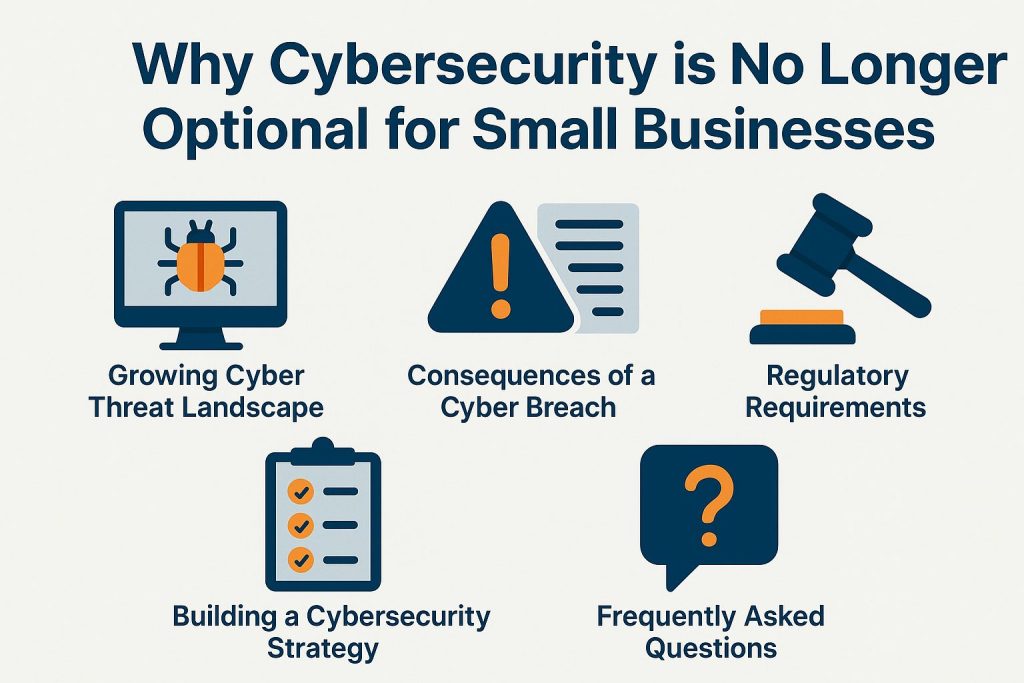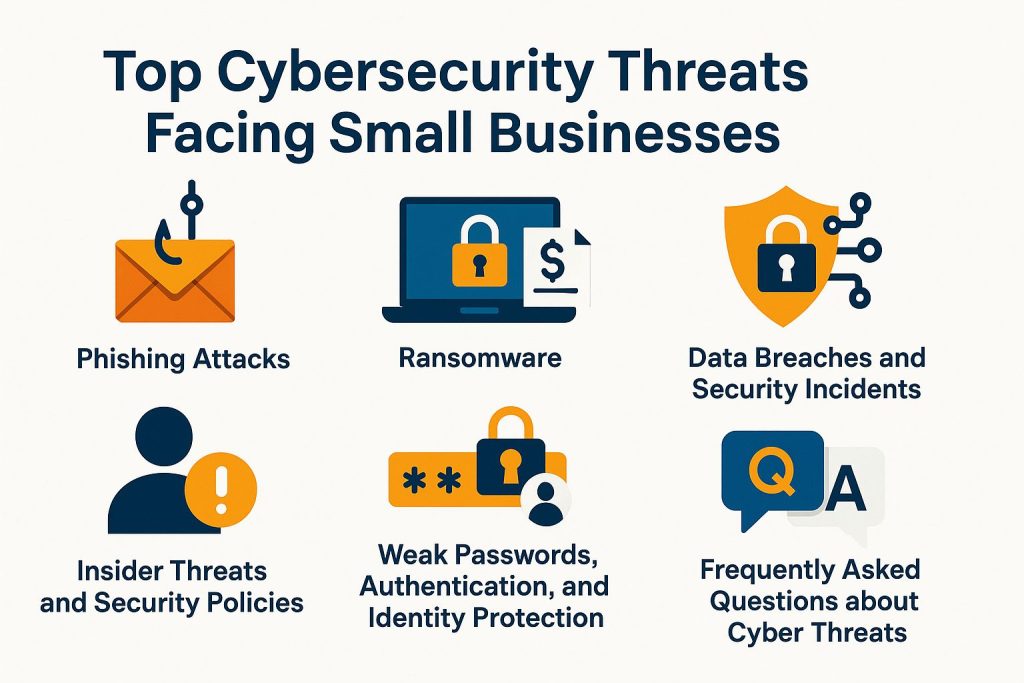Why Cybersecurity is No Longer Optional for Small Businesses

Cyber threats are growing. Small businesses are more vulnerable now. Large corporations used to dominate this area. A cyber breach can cause severe financial loss and legal issues. It’s important to understand cyber attacks. Businesses need a strong cybersecurity strategy. This article explains why small businesses need to adopt essential security measures. These measures protect their operations, digital assets, and business reputation.
Growing Cyber Threat Landscape
Cyber threats are always changing. Small businesses face many types of attacks like ransomware and phishing. In the last two years, phishing attacks have increased by 300%. This poses a major risk for small businesses. They often lack comprehensive security measures and proper threat detection.
A recent incident involving a mid-sized retailer that lost $200,000 due to a phishing scheme exemplifies this risk. To mitigate such threats, businesses may consider implementing multi-factor authentication and investing in employee training programs.
Tools like KnowBe4 can help train employees about cybersecurity. Solutions like CrowdStrike can improve security postures, thereby increasing the likelihood of protection rather than victimization through effective incident management and security audits. (For more on this, see our Proactive IT Security Strategy for Business Success)

Types of Cyber Attacks
Small businesses face a range of cyber attacks, including ransomware, phishing, and malware, each presenting distinct characteristics and consequences.
For example, ransomware targets important data. It locks files until a ransom is paid. This shows why encryption and cyber insurance are important. In 2021, more than 80% of small companies reported experiencing such attacks.
Phishing schemes use fake emails to get sensitive information. About 1 in 4 people fall for these tricks, underscoring the need for phishing awareness and security culture.
Malware encompasses a broad category of malicious software that can disrupt operations and steal data, impacting nearly 60% of small businesses, emphasizing the necessity of malware protection.
Additionally, insider threats can emerge when employees misuse their access privileges, underscoring the necessity of implementing stringent access controls.
Distributed Denial of Service (DDoS) attacks can overwhelm systems, compromising service availability and challenging online safety. Therefore, businesses should invest in anti-DDoS solutions to effectively reduce these risks. One of our most insightful case studies demonstrates effective cybersecurity strategies to protect against these threats.
Consequences of a Cyber Breach
The consequences of a cyber breach can be very damaging. Small businesses can lose an average of $200,000. They endure long-term reputational damage and face potential challenges with intellectual property protection.
For instance, a local coffee shop in Texas experienced a cyber breach that exposed customer credit card information. The recovery process entailed expenses exceeding $50,000 for forensic investigations and legal fees, illustrating the importance of having an effective incident response plan.
After the breach, the coffee shop saw a 30% drop in customers because of lost trust. In response, the business invested in security enhancements and prioritized transparency by engaging with customers about their new measures. As mentioned, implementing a proactive IT security strategy is crucial for businesses to prevent such incidents.
By demonstrating a commitment to data safety and compliance regulations, the coffee shop gradually regained customer confidence; however, it took over a year for their business to return to pre-breach levels.

Financial Impact
The financial impact of a cyber breach is not just immediate costs. It averages around $200,000, which can severely hinder small businesses in terms of recovery, regulatory compliance, and cyber liability. These costs can be categorized into specific areas.
Initially, immediate response costs include forensics and legal fees. These can exceed $50,000. Businesses also lose revenue due to downtime. This averages about $70,000 for one week offline. Long-term recovery efforts, like customer retention and system upgrades, can cost an additional $80,000 or more.
For example, a local retail shop recently reported these figures following a ransomware attack, which necessitated a complete overhaul of their cybersecurity measures.
Regulatory Requirements
Small businesses must navigate a complex landscape of regulatory requirements, such as GDPR and HIPAA, to ensure compliance and protect customer data. Businesses should implement specific measures to maintain compliance.
For GDPR, businesses must have a clear privacy policy. This policy should outline data usage and obtain explicit consent from customers before data collection. In the case of HIPAA, businesses must secure data storage and train staff on confidentiality.
Non-compliance can result in substantial fines; for instance, violations of GDPR can incur penalties of up to EUR20 million or 4% of annual revenue. Regular audits and compliance management software streamline compliance and reduce risks, ensuring robust cybersecurity solutions. Worth exploring: Cybersecurity Best Practices for Small Businesses.
Building a Cybersecurity Strategy
A good cybersecurity strategy involves assessing risks, implementing security measures, and preparing for incidents.
Organizations should begin by conducting a thorough risk assessment utilizing frameworks such as the NIST Cybersecurity Framework to identify vulnerabilities specific to their operations.
Following this, it is important to develop detailed incident response plans that outline the necessary steps to take in the event of a breach. Security protocols, including firewalls, antivirus software, and endpoint protection, should be incorporated to safeguard against various threats.
Continuous monitoring is critical. Tools like Splunk or Nagios track network activity, threat intelligence, and anomalies in real-time. This proactive approach ensures rapid detection and response, ultimately reinforcing the organization’s security posture.
Related insight: Learn how cybersecurity measures can be enhanced through the support of managed IT services, as discussed in our article on the Top 5 Benefits of Choosing Greensboro Managed IT Services.

Essential Security Measures
Implementing essential security measures, such as endpoint security, firewalls, employee training, and cyber hygiene, significantly reduces vulnerability to cyber threats.
For instance, a mid-sized company that installed Norton endpoint security and a Cisco ASA firewall experienced a 40% reduction in cyber incident reports within a year.
Regular cybersecurity training sessions utilizing KnowBe4 equipped employees to recognize phishing attempts, further strengthening their defenses.
Companies like TechCorp discovered that by integrating BitLocker for data encryption with these measures, they not only enhanced their security posture but also improved compliance with regulations and enhanced business continuity, creating a comprehensive approach to system protection.
Frequently Asked Questions
Why is cybersecurity no longer optional for small businesses?
Cybersecurity is no longer optional for small businesses because they are increasingly becoming targets of cyber attacks. The rise of digital dependence, technology dependence, and remote work security has made small businesses vulnerable to cyber threats, making it crucial for them to have robust cybersecurity measures in place to protect their assets and sensitive data.
What are the consequences of not having proper cybersecurity measures in place?
Not having proper cybersecurity measures in place can result in serious consequences for small businesses, including security breaches and increased vulnerability to online threats. This includes financial losses, damage to reputation, and legal liabilities. Cyber attacks can also disrupt business operations and cause significant downtime, leading to loss of productivity and revenue.
What are some common cyber threats that small businesses face?
Small businesses face a variety of cyber threats, including phishing scams, malware attacks, ransomware, and social engineering. These attacks can occur through emails, websites, or physical devices like USB drives. It’s important to have a multi-layered cybersecurity approach and strong policies.
How can small businesses improve their cybersecurity?
Small businesses can improve their cybersecurity by using strong passwords, regularly updating software and systems, encrypting sensitive data, and providing cybersecurity training to employees. They should also have a backup and disaster recovery plan for cyber attacks.
Is investing in cybersecurity worth the cost for small businesses?
Yes, investing in cybersecurity is crucial. It protects small businesses from potential losses and damages from cyber attacks. The initial cost may seem high. However, the consequences of a cyber attack can be much more costly. This affects business threats and cyber resilience.
Can small businesses outsource their cybersecurity needs?
Yes, small businesses can outsource cybersecurity. They can work with third-party vendors or managed service providers. This helps address third-party risks and enhances security. Outsourcing gives them access to expert cybersecurity professionals. They can use advanced technologies. This is often cheaper than hiring an in-house team. This lets small businesses focus on their core operations. They can leave cybersecurity to the experts.




